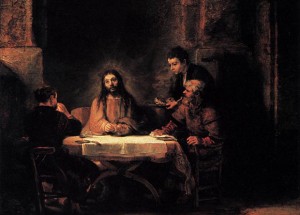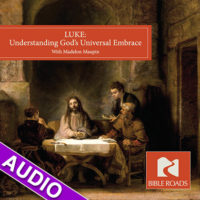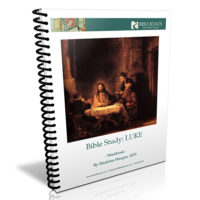April is the month parallel to those ancient, world-changing days when Jesus made resurrection appearances. According to Luke’s Gospel, all three occurred before the anticipated Jewish Pentecost festival – held fifty days following Passover. This month’s blogs will focus on this period of Jesus’ life between the resurrection and ascension, and examine those three appearances in the order Luke describes.
First, the two followers on the road to Emmaus. If ever one is sad or disappointed, this is the story to wake us up and out of such a mental stupor. Christ comes to rescue his own. Wherever we find ourselves, regardless of how lost or stunned by life’s disappointments, one of Christ’s most tender functions is to seek us out and bring us ‘home’.
I’ve seen many treasured insights over the past few years in this remarkable Gospel by following Luke’s ‘hint to readers’ in his prologue. In Luke 1:1-4 he literally tells how we can gain the most from his version of Jesus’ story. Explaining to Theophilis, possibly his sponsor or backer (much like the Medici’s were to Michaelangelo), Luke tells us he is writing ‘an orderly account’ (1:3). So by paying close attention to the order in which he has written down the Gospel account, we see relationships to texts perhaps before unnoticed.
This is how the ‘walk to Emmaus’ story leapt off the page this Easter season for me. It follows , although not immediately, one of my favorite chapters (15), in which Luke tells us how the ever caring Christ helps us find our lost sheep, lost coins or lost children. In the latter–the loved Prodigal Son parable–as soon as the son turns to go home to his Father, the Father (uncharacteristic for a patriarchal society), runs to meet his son rather than wait for the young man to approach him.
It is as if the Emmaus story is the fourth segment of these three ‘seeking and finding’ stories. Only here the two followers haven’t turned, as did the Prodigal, to go back to Jerusalem. They are still walking away. Yet “even there shall thy hand lead me, and thy right hand shall hold me,” as the Psalmist wrote in 139:10. God, through His Christ, always seeks out His own.
Sometimes life’s events just seem too much and we want to throw in the proverbial towel, or at the very least, go home. Cleopas and his friend tried to put the unjust trial and horrific crucifixion behind them by leaving the city of David, returning possibly to their own village after Passover since the Sabbath was over. How understandable that those events would have been overwhelming for them, indicated by the Stranger pointing out that they were ‘sad’, as he comes along beside them (Luke 24: 17).
However, instead of staying with only the recent transpiring of tragedy, Jesus challenges them to rethink ‘what things’ (v. 19) have really occurred. He redirects their thought not to what their eyes have just seen, but what can be spiritually discerned in Scripture about himself.
This first appearing of the risen Christ delivers so many lessons in Luke’s Gospel. Just one is that instead of being so fixated on the unfolding drama of current news, regardless of what time period we’re in, maybe the Master Christian is asking us to keep our eye on the Scriptures, on how God is always in charge of Her creation, always unfolding events to prove that good does triumph over evil, life over death. This is my Easter lesson from Emmaus.





Thank you Madelon for another simple lesson that enlightens a very challenging part of the Bible. Love the tie in between the Emmaus story and the others and the fact that the Father figure in their society would normally wait to be approached! So many Bible scholars including you help us to see so much more in the Scritures than we would see on our own. The laws and mores that would normally hold us and them in Jesus’ time back
from discerning the ongoing emergence of the timeless truths of God’s love for all melt away.
What a great Easter insight Madelon. Thank you. Jesus’ lessons were always tender, so how appropriate it was for him to tenderly draw his two followers back to Scripture during this time of confusion and distress. This then becomes our method of moving forward in the right direction when events on the human scene try to take us off course.
Joy in Missouri —
Thank you so much, Madelon, for these so tender, sweet insights about Christ and our individual relationship to Him. When I read your line in this post, “Wherever we find ourselves, regardless of how lost or stunned by life’s disappointments, one of Christ’s most tender functions is to seek us out and bring us home,” I just started crying — your words ring so true. Wow! There are just no appropriate words to describe how wonderful that makes me feel. The only way I can really fully respond with is tears.